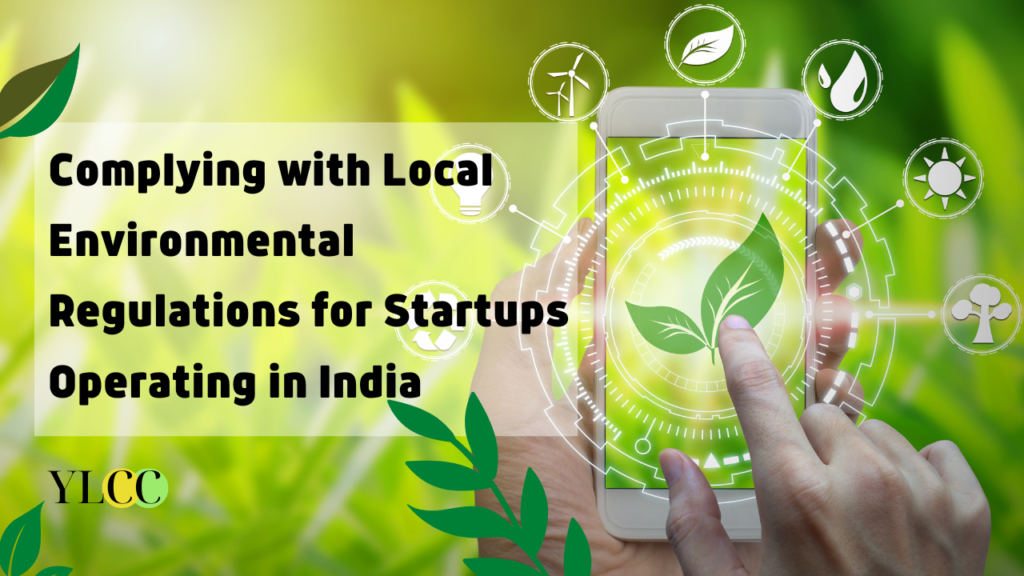
Going Green for Good!
Starting a business in India can be super exciting – you’re bringing fresh ideas to the table and adding to the country’s economy. But as your start-up grows, you’ll face some challenges – and one of them is making sure you’re staying on top of environmental laws and regulations. Don’t worry, though, with a little know-how and effort, you can make sure your business stays compliant while still crushing your goals!
Environmental Protection Remains an Important Aspect Often Overlooked
Hey, you know what’s not cool? Ignoring the environment! When it comes to start-ups, there’s often so much focus on creating the next big thing and making bank that we forget about our environmental responsibilities. But let’s face it, the impact of start-up activities on the environment can be a big deal.
While building your business empire, you may be tempted to cut some corners to save time and money. But when it comes to following the rules, you simply can’t ignore them! Environmental laws are no exception. You don’t want to mess with Mother Nature, right? These laws exist to keep our planet safe and healthy for all of us, so it’s crucial that your start-up follows them. From proper waste disposal to limiting pollution, complying with environmental laws will not only keep you out of legal trouble but will also help create a better world for generations to come.
Regulations and Legislations: Let’s Talk About the Law, Baby!
Okay, so we get it, talking about laws and regulations can be a real snooze-fest. But trust us, when it comes to environmental law compliance, you need to pay attention! Here are some of the key acts and laws that every start-up needs to know about:
Water (Prevention and Control of Pollution) Act, 1974 (Water Act)
This act aims to prevent and control water pollution by regulating the discharge of pollutants into water sources. It also provides for the establishment of boards to monitor and prevent water pollution.
Air (Prevention and Control of Pollution) Act, 1981 (Air Act)
This act focuses on regulating air pollution and sets standards for emissions from industries and vehicles. It also establishes central and state pollution control boards to enforce compliance.
Environment (Protection) Act, 1986 (EP Act)
This act is a comprehensive environmental legislation that covers all aspects of environmental protection, including the regulation of hazardous substances and the prevention of environmental pollution.
Wild Life (Protection) Act, 1972
This act provides for the protection of wild animals and plants, and prohibits hunting, poaching, and trade in endangered species.
Forest (Conservation) Act, 1980
This act aims to conserve forests and wildlife by restricting the diversion of forest land for non-forestry purposes without prior approval from the central government.
Public Liability Insurance Act, 1991
This act provides for mandatory insurance coverage for industries dealing with hazardous substances. It also establishes a mechanism for compensating victims of accidents caused by such substances.
Biological Diversity Act, 2002
This act aims to conserve India’s biodiversity by regulating access to genetic resources and ensuring fair and equitable sharing of benefits arising from their use.
National Green Tribunal Act, 2010
This act provides for the establishment of a specialized court to deal with environmental disputes and ensure speedy resolution of such cases.
So, there you have it, folks! While these laws may seem like a mouthful, they are essential for the protection of our environment and the sustainability of our planet.
Welcome to the World of Environmental Permits: Navigating the Regulatory Maze!
It may seem like a daunting task for any start-up to obtain an environmental permit, but fear not, we’re here to help. Here are some fun facts to make the regulatory landscape a little more digestible:
Have you heard of the White Industries concept? No, it’s not a paint company. It refers to industries that are considered non-polluting and are exempt from obtaining an environmental permit. That’s right, no permit needed for these good guys!
If you’re not a White Industry, don’t worry, you’ll be categorized into Red, Orange, or Green categories based on your potential environmental impact. It’s like a traffic light system for your environmental impact. Just try to avoid being in the red zone, or you’ll have the most stringent regulatory oversight.
To determine your category, a Pollution Index (PI) score is allocated based on the resources utilized and waste generated. Think of it like a report card, but for your environmental impact. Aim for an A+ in sustainability!
Now, if you’re feeling overwhelmed by the permit application process, fear not! There’s a system of integrated permits to simplify things. It’s like a one-stop-shop for all your permit needs, reducing the administrative burden on the industry. Yay for efficiency!
Just remember, environmental permits have a validity period and must be renewed periodically. But hey, it’s like renewing your driver’s license, just with more environmental responsibility. And who doesn’t love being environmentally responsible?
Importance of Complying with Environmental Regulations
Environmental regulations are put in place to protect the environment, human health, and promote sustainable development. Non-compliance with these regulations can lead to penalties, legal actions, damage to the environment, and loss of reputation. Compliance with environmental regulations helps startups to:
Avoid Penalties and Legal Consequences: Non-compliance with environmental regulations can lead to heavy fines, revocation of licenses, and even criminal charges. Complying with environmental regulations can help businesses avoid these penalties and legal consequences.
Gain a Competitive Edge: Startups that comply with environmental regulations gain a competitive edge over their competitors who do not comply. Compliance with environmental regulations shows that a business is responsible, ethical, and committed to sustainability.
Protect the Environment and Human Health: Compliance with environmental regulations helps businesses to prevent pollution, reduce waste, and conserve natural resources. This protects the environment and human health from the negative impacts of business operations.
Steps to Ensure Compliance with Environmental Regulations
Understand the Environmental Regulations: Startups should familiarize themselves with the environmental regulations applicable to their industry and location. This includes understanding the permitted limits for pollutants, waste disposal, and other environmental standards.
Obtain Necessary Permits and Licenses: Startups must obtain all the necessary permits and licenses required by the environmental regulations. This includes obtaining environmental clearances, pollution control board approvals, and other licenses and permits.
Monitor Compliance: Startups should regularly monitor their compliance with environmental regulations. This includes monitoring emissions, waste disposal, and other environmental impacts of business operations.
Implement Environmental Management Systems: Startups can implement environmental management systems to ensure compliance with environmental regulations. Environmental management systems help businesses to identify, monitor, and control their environmental impacts.
Train Employees: Startups should train their employees on environmental regulations and the company’s environmental policies and procedures. This ensures that employees are aware of their roles and responsibilities in ensuring compliance with environmental regulations.
Riding the Rapids: An Example of Environmental Compliance for Start-ups
Let’s take a trip down a hypothetical river and see what could happen if you don’t comply with the environmental laws.
You’re floating down the river, enjoying the scenery, when suddenly you notice something odd. The water has turned a strange color and there’s a foul smell in the air. You paddle over to the bank and investigate, only to find that your start-up’s industrial waste is being dumped into the river without treatment.
Feeling outraged, you jump out of your canoe and start making calls to the authorities. The Central Pollution Control Board soon arrives on the scene, and they are not happy. They inform you that you are in violation of the Water Act and that you could face heavy fines and even imprisonment.
As you stand on the riverbank, watching the authorities measure the pollution levels and issue citations, you can’t help but think about the impact this will have on your start-up. Not only will you face legal consequences, but your reputation as an environmentally conscious business will be tarnished.
But it doesn’t end there. As you try to explain your situation to your customers, you realize that they’re not interested in excuses. They want to support businesses that prioritize sustainability and environmental responsibility.
Now, let’s rewind and imagine a different scenario. You comply with the environmental laws and regulations, and your start-up establishes itself as a socially responsible business. Your customers appreciate your commitment to the environment, and they spread the word to their friends and family.
As you paddle down the river, you notice that the water is crystal clear, and the air smells fresh. You smile to yourself, knowing that you’re doing your part to protect the environment and create a better future for everyone.
Conclusion
It’s time to get your green on and comply with local environmental regulations. Not only is it a legal and ethical responsibility, but it can also save you from penalties and give you a leg up on the competition. Plus, who doesn’t want to protect the environment and human health? To make sure you’re following the rules, be sure to understand the regulations, get the necessary permits and licenses, keep an eye on compliance, implement environmental management systems, and train your employees. By doing your part, you can contribute to sustainable development and keep the environment happy and healthy for generations to come!
This article has been written by Team YLCC. For any other queries, reach out to us at: queries.ylcc@gmail.com






